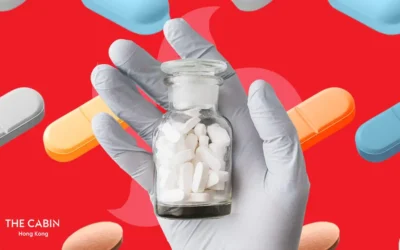With deaths from overdoses increasing every year, the world is racing to understand what’s behind the opioid crisis.

Sharelines
Drug overdoses are now the leading cause of injury-related death in the US, surpassing car accidents, suicides and gun-related casualties. As the US struggles to contain this crisis, countries around the world are watching closely to understand what’s causing the overdose epidemic, and how to mitigate potential impacts.
For Hong Kong, The Cabin offers an effective and unique treatment programme for those grappling with drug dependency, targeting all the factors that contribute to addiction in order to carve out a sustainable path to recovery.
The Opioid Problem in America
Most agree that the US crisis began in the 1990s with a successful pharmaceutical industry marketing effort to promote opioid painkillers for chronic pain relief, leading to rapidly increasing prescription rates. In 2015 alone, roughly 38% of Americans were prescribed opioids.
As more people are prescribed pain killers, dependency also increases. Prescription drug dependency is a common predecessor for the use of illicit street drugs, with 75 per cent of opioid misusers reporting that their drug use started with prescription pills.
Though the supply of opioids is an important factor in the American overdose epidemic, understanding the demand is also critical. Physical pain can lead to an opioid prescription, but co-occurring disorders, including trauma, anxiety and depression, can play a significant role in the abuse of and addiction to these powerful drugs.
For people struggling with opioid abuse, overdose is always a risk. Pursuing treatment is critical, as is identifying a rehab programme that can successfully address the multiple factors that feed an addiction.
Will it Happen in Hong Kong?
While the same crisis has yet to hit Hong Kong, there are global concerns that the increasing rate of prescriptions for opioid-based painkillers could lead to similar problems. Additionally, heroin—an illegal opiate—remains one of the most abused drugs in Hong Kong, with high rates of methamphetamine and ketamine use also raising serious concerns.
Sky Siu, director of Hong Kong-based NGO KELY Support Group, told the South China Morning Post that now is the time for diligence to ward off a more widespread problem.
“We have to learn from the US—we don’t want to wait until we have an epidemic. We need to start now, be proactive and really hone in on the fact that drug and alcohol issues aren’t things that happen to another family. It’s something that could very well happen to yours and can drastically change your entire life,” she said.
Warning Signs of Opioid Abuse
It is normal for people dependent on opioids or other drugs to be in denial about how serious the problem is. In Hong Kong, prescription medications like Vicodin or Oxycontin are commonly misused, but the fact that such pills are legally used for medical purposes can make it even more difficult for people struggling with abuse to seek help. Some signs that you or a loved one may have a problem with opioids include:
- Increased drowsiness, such as nodding off during the day
- Slowed breathing
- Constricted pupils
- Disinterest in previously enjoyed activities
- Poor personal hygiene
- Confusion
- Constipation
- Elated or rapidly changing moods
- Withdrawal symptoms, such as increased pain or flu-like symptoms
Once an opioid dependency is identified, the next step is determining which type of treatment can best serve the needs of the individual seeking help.
Treatment for Opioid Abuse in Hong Kong
Outpatient care is one highly sought-after treatment for addiction; The Cabin Hong Kong provides these services at an exceptional standard. For those who are struggling with substance abuse but need to maintain career and family responsibilities, outpatient services can be a smart choice.
If you or someone you love is suffering from a serious opioid addiction, an inpatient programme may be necessary. The Cabin Group offers a world-class inpatient centre just a short flight away in the lush mountains of Chiang Mai, Thailand. It also provides the added benefit of a safe environment away from triggers or negative influences that may disrupt your recovery in Hong Kong.
Our treatment programmes work with the ‘whole client’—rather than simply addressing a physical drug dependency—and boast a 96% completion rate. Contact us today to find out how we can help you or someone you know take the first step toward recovery.




